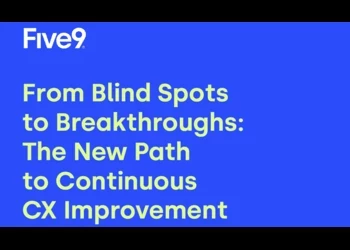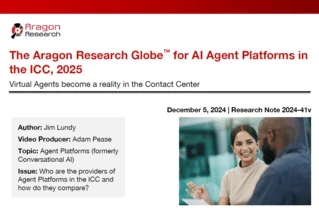The future contact centers are unrecognizable thanks to AI
Artificial intelligence (AI) is transforming future contact centers to meet rising customer demands and budget limitations
Add bookmark
Artificial intelligence (AI) is impacting the fate, composition and outlook of future contact centers. As customer demands rise, AI is allowing companies to respond with more efficient and personalized support. The trajectory of change is rapid and is changing the role of human agents, the composition of the staff and the way support is provided. It is also revolutionizing the type of CX that can be offered to consumers.
Recently, thought leaders, industry experts and CX professionals gathered at All Access: Future Contact Centers 2025 to discuss the swift evolution and what this means for tomorrow's customer support.
Tenth annual flagship report. AI has transformed CX, raising expectations with investment in AI for CX automation, machine learning, and conversational AI now a top priority. Download the Global State of CX to learn how the industry is preparing for the new AI first future.Special Report: The Global State of CX

AI is transforming CX in the telecoms industry
Sharang Sharma, vice president at Everest Group, joined Suzanne Edmondson, senior client partner at Capita, in a panel discussion previewing Capita’s latest report around CX in the telecoms industry. AI emerged as a key theme, as its “finally starting to mature, which means that it’s no longer just a vanity project,” said Sharma.
The importance of journey mapping was emphasized, as it needs to be fed consistent data to evolve over time. Indeed, journey analytics and hyper-personalization were both highlighted as exciting practical use cases of AI in CX. Edmondson advised that leaders should “start with a strategy and not technology... identify high impact use cases where AI can deliver measurable value.”
Watch the session on-demand here.
Turning future contact centers into profit centers
Michael Kors understands the importance of seamless CX. To create this, Ebrahim Hyder, vice president of customer care, has meticulously woven the retail experience into the BPO contact center, ensuring the Michael Kors brand feel remains consistent throughout a customer’s journey. Initiatives such as custom decor matching stores, TVs playing fashion runway shows and even a physical product showroom for agents to interact with products cultivate a sense of belonging and brand pride for agents, which ultimately leads to better customer service.
“The attrition rate for our account is very low at 3 percent, compared to the average which is about 13 percent," he said.
He also noted that early and effective adoption of agent-facing AI has led to improved fraud detection, handle time and email response consistency. He noted that he and his team took time to extensively train the AI on brand voice and policy to avoid generic or inaccurate responses.
Watch the full session on-demand here.
AI and human collaboration
This was a key point from Matthew Saskin, vice president of commercial operations, digital and AI at Genesys: “That’s not a world where everything is automated and where all the human agents are replaced. Rather, that’s a world where humans are empowered by enhanced AI capabilities.”
Genesys defines AI capabilities across four pillars, each tied to business value:
- Automation – Virtual agents and bots.
- Augmentation – Co-pilots and agent assist tools.
- Personalization – Tailored CX using data.
- Optimization – Continuous improvement using analytics.
Nicholas Smith, director of digital and AI at Genesys, emphasized that AI must be tied back to measurable outcomes, saying “The real question isn’t necessarily, what can AI do? It’s really what can AI move?”. He recommended taking an iterative, three-stage approach:
- Foundation – Quick wins like FAQ bots and summarization.
- Transformation – Predictive routing, sentiment analysis.
- Innovation – Proactive engagement and agentic AI.
Watch the session on-demand here.
Taking CX beyond chatbots
Many companies may sacrifice personalization for speed of service or vice versa, but agentic AI is paving a way out of this common conundrum.
Agentic AI, such as that Talkdesk’s Customer Experience Automation is a gamechanger for CX orchestration: “Instead of relying on a single monolithic bot, we can use specialized agents, each with its own roles and skills.", explained Kevin McNulty, senior director of product marketing at Talkdesk, “an orchestrator agent acts like a project manager… deciding who does what, in what order and under what conditions.”
The goal is no longer simple ticket automation, but is automating entire processes across the lifecycle of CX. The success of CXA, McNulty explained, depends on data. The data used to feed agents must be high-quality and must be unified.
Watch the session on-demand here.
Agentic AI adoption in financial services
“The fear of doing nothing has exceeded the fear of doing something with AI,” said to Harry Clapham, director of operations strategy and enablement at Tangerine, Forbes’ number one bank in Canada.
"It's important, when you deploy these technologies, that you pick the right limited use case. Maybe it's an FAQ, maybe it's a transactional use case, you prove it out, and you expand over time," advised Max Black, vice president of sales at ASAPP. The Tangerine team took this advice and applied a strategic approach to AI implementation, beginning with smaller wins such as an FAQ bot for credit card customers. This “lower-risk model” proved capabilities and built trust internally.
When it comes to evaluating AI project criteria, Clapham emphasized four key areas:
- Effort (cost, time, resources).
- Scalability and impact.
- AI readiness (model maturity).
- Operational readiness (ability to commercialize).
Risk and compliance is a huge focus for those in regulated industries, who can be more hesitant to take the leap into AI. Transparency and early involvement of risk stakeholders were highlighted by Clapham as essential in the implementation process. "Info security, compliance, privacy, trust. It's not a checkbox. It should be at the foundation of the implementation," agreed Black.
Watch the session on-demand here.
Conversational AI in practice
Virgin Money first implemented an AI virtual assistant, Redi, in 2022 for credit card customers, before scaling it into mobile banking. The reception from agents and customers alike has been overwhelmingly positive.
"Colleagues are really keen... they see Ready as an extension of their team, a kind of helping hand," explained Laura MacLeod, digital product strategy senior manager at Virgin Money. “They can have an element of context in terms of what the customer is looking for... a warm hand over into that more complex, sensitive nature."
Likewise, customers “enjoy using the service... they find it easier to type a question and talk back and forth, rather than to digitally self-serve”.
Virgin Money has seen an increase in contacts, rather than a decrease, because of the convenience of Redi, which is easy to use, consistent in responses and available 24/7.
When integrating AI, MacLeod was clear: Virtual assistants must be treated as extensions of the wider team.
“We treat the virtual assistant as an extension of the team... if you type into Ready and you swear at Ready, we don't let you do that. We wouldn't let you do that to our colleagues either,” she explained.
Watch the full session on-demand here.
Embrace strategic value, strengthen relationships, redefine the agent’s role
Brad Cleveland, author of bestselling Contact Center Management on Fast Forward and former president and CEO of ICMI, outlined three key areas where contact centers can provide value:
Efficiency: Handling work effectively, preventing issues, automating processes and managing forecasts and schedules.
Customer satisfaction: Measuring and improving how customers feel about their interactions with the organization.
Strategic value: Capturing and sharing insights across the organization to help other departments understand customer perspectives and improve processes.
He particularly emphasized the importance of strategic value, sharing an example of an insurance company using contact center insights to help other parts of the organization understand customer needs around risk and policies, which ultimately helps them gain market share and improve their reputation.
To increase the strategic value of contact centers, both Cleveland and fellow panelist, Vinay Parmar, managing director of Customer Whisperers and CX Network Advisory Board member, recommended that agents get to know the wider business better and vice versa. Parmar pointed to an example from his previous experience in which agents were embedded into a digital transformation team. In this, the agents represented the Voice of the Customer (VoC), helping to shape product design and ultimately becoming permanent members of the team. Parmar also noted “The more successful you become in an organization, the further you get away from the customer... you're starting to become more dependent on somebody else's narrative." On this point, Cleveland recommended “Get your senior level leadership to sit next to your agents... it’s just so eye opening."
On redefining the role of agents, Cleveland said, "These are not entry-level jobs... the breadth of customers, products, services, channels and technology we use is incredibly complex.”
Parmar said that contact center agents are “gathering data subliminally through the calls they listen to, through the things they spark through the conversations they have." Both speakers ultimately agreed that agents’ roles must be redefined as entry-points, rather than entry-level.
Operational resilience at Spirit Airlines
Spirit Airlines has adopted what Vanessa Hardy-Bowen, VP of guest care and contact centers, described as an “elasticity model.” The strategy is designed to reduce contact volume, creating operational resilience during unpredictable surges during disruptions that can double contact numbers. In developing AI-powered, adaptable self-service flows, Spirit maintains consistent customer experiences even during surge periods. This has not only deflected contacts, but has granted agents the space to think stategically and deliver better care during complex interactions.
Watch the session on-demand here.
Testing ground for digital transformation
Mayo Clinic’s Innovation Contact Center, led by Courtnie Garteski-Bergler, is a controlled environment to test digital workflows before full rollout. The team tests new tools and processes, and outlines results based on feedback and issue logs. There has been some surprising results, such as that simpler text messages were better received by patients than more detailed ones. Garteski-Bergler described how the team has created a “menu of best practices” with efficiency scores, empowering different departments to choose the most appropriate solutions for them. This self-selection approach improved organization buy-in.
Watch the session on-demand here.
Insights on Disney's service excellence
Barry Jacobson, former Disney executive and current CX consultant, joined to explain how the media and IP giant creates emotional connections with both employees and customers. He outlined Disney’s G.U.E.S.T approach:
- Greet everyone with a smile
- Understand everyone as individuals
- Exceed expectations
- Solve challenges
- Thank customers for their business
Jacobson also delved into his “People + Purpose + Place + Pride = Profit” formula, through which investing in employee experience directly improves customer satisfaction. In this, contact center leaders create a sense of purpose “to create solutions” rather than simply “answering phones,” which nurtures a sense of belonging. Jacobson also emphasized the importance of consistent and ongoing traning and recognition of achievements.
Watch the full session on-demand here.

Don't miss any news, updates or insider tips from CX Network by getting them delivered to your inbox. Sign up to our newsletter and join our community of experts.






















